| dc.contributor.advisor | Karen E. Willcox. | en_US |
| dc.contributor.author | Lieberman, Chad Eric | en_US |
| dc.contributor.other | Massachusetts Institute of Technology. Computation for Design and Optimization Program. | en_US |
| dc.date.accessioned | 2010-04-26T19:19:14Z | |
| dc.date.available | 2010-04-26T19:19:14Z | |
| dc.date.copyright | 2009 | en_US |
| dc.date.issued | 2009 | en_US |
| dc.identifier.uri | http://hdl.handle.net/1721.1/54213 | |
| dc.description | Thesis (S.M.)--Massachusetts Institute of Technology, Computation for Design and Optimization Program, 2009. | en_US |
| dc.description | This electronic version was submitted by the student author. The certified thesis is available in the Institute Archives and Special Collections. | en_US |
| dc.description | Cataloged from student submitted PDF version of thesis. | en_US |
| dc.description | Includes bibliographical references (p. 113-118). | en_US |
| dc.description.abstract | Decisions based on single-point estimates of uncertain parameters neglect regions of significant probability. We consider a paradigm based on decision-making under uncertainty including three steps: identification of parametric probability by solution of the statistical inverse problem, propagation of that uncertainty through complex models, and solution of the resulting stochastic or robust mathematical programs. In this thesis we consider the first of these steps, solution of the statistical inverse problem, for partial differential equations (PDEs) parameterized by field quantities. When these field variables and forward models are discretized, the resulting system is high-dimensional in both parameter and state space. The system is therefore expensive to solve. The statistical inverse problem is one of Bayesian inference. With assumption on prior belief about the form of the parameter and an assignment of normal error in sensor measurements, we derive the solution to the statistical inverse problem analytically, up to a constant of proportionality. The parametric probability density, or posterior, depends implicitly on the parameter through the forward model. In order to understand the distribution in parameter space, we must sample. Markov chain Monte Carlo (MCMC) sampling provides a method by which a random walk is constructed through parameter space. By following a few simple rules, the random walk converges to the posterior distribution and the resulting samples represent draws from that distribution. This set of samples from the posterior can be used to approximate its moments. | en_US |
| dc.description.abstract | (cont.) In the multi-query setting, it is computationally intractable to utilize the full-order forward model to perform the posterior evaluations required in the MCMC sampling process. Instead, we implement a novel reduced-order model which reduces in parameter and state. The reduced bases are generated by greedy sampling. We iteratively sample the field in parameter space which maximizes the error in full-order and current reduced-order model outputs. The parameter is added to its basis and then a high-fidelity forward model is solved for the state, which is then added to the state basis. The reduction in state accelerates posterior evaluation while the reduction in parameter allows the MCMC sampling to be conducted with a simpler, non-adaptive 3 Metropolis-Hastings algorithm. In contrast, the full-order parameter space is high-dimensional and requires more expensive adaptive methods. We demonstrate for the groundwater inverse problem in 1-D and 2-D that the reduced-order implementation produces accurate results with a factor of three speed up even for the model problems of dimension N ~~500. Our complexity analysis demonstrates that the same approach applied to the large-scale models of interest (e.g. N > 10⁴) results in a speed up of three orders of magnitude. | en_US |
| dc.description.statementofresponsibility | by Chad Eric Lieberman. | en_US |
| dc.format.extent | 118 p. | en_US |
| dc.language.iso | eng | en_US |
| dc.publisher | Massachusetts Institute of Technology | en_US |
| dc.rights | M.I.T. theses are protected by
copyright. They may be viewed from this source for any purpose, but
reproduction or distribution in any format is prohibited without written
permission. See provided URL for inquiries about permission. | en_US |
| dc.rights.uri | http://dspace.mit.edu/handle/1721.1/7582 | en_US |
| dc.subject | Computation for Design and Optimization Program. | en_US |
| dc.title | Parameter and state model reduction for Bayesian statistical inverse problems | en_US |
| dc.type | Thesis | en_US |
| dc.description.degree | S.M. | en_US |
| dc.contributor.department | Massachusetts Institute of Technology. Computation for Design and Optimization Program | |
| dc.identifier.oclc | 587391776 | en_US |
